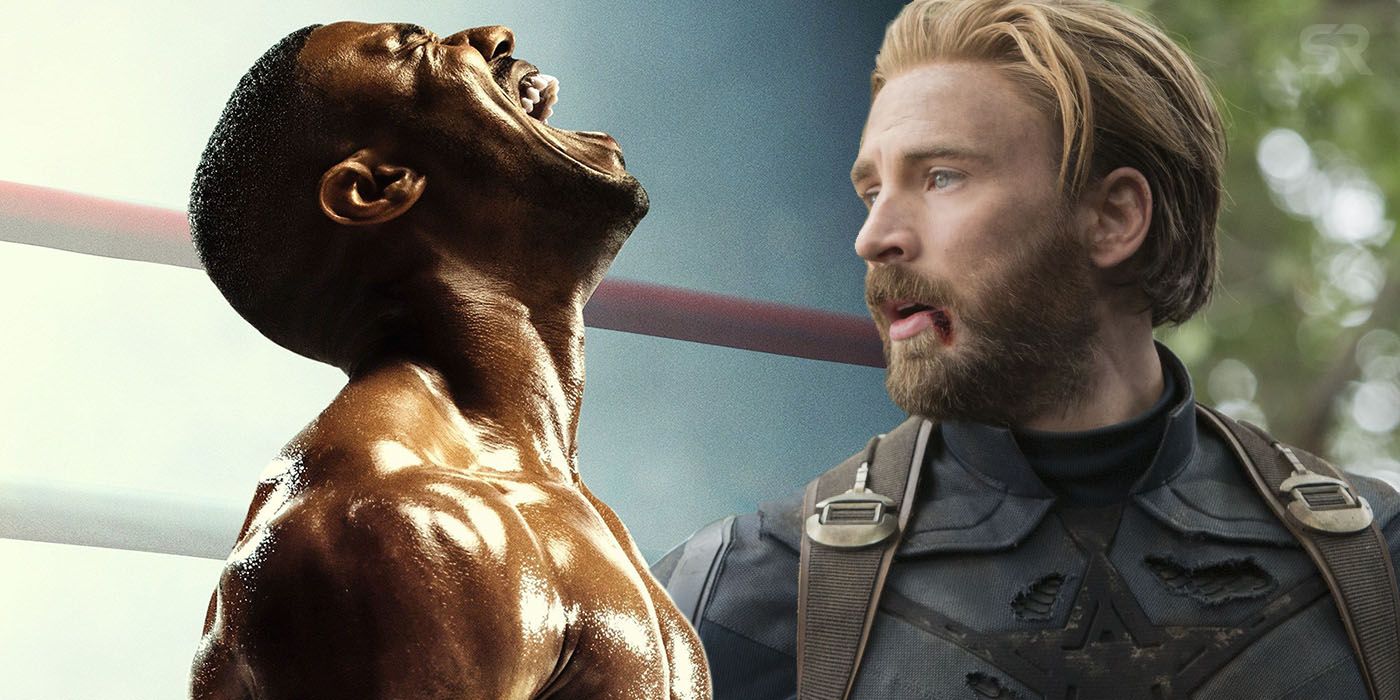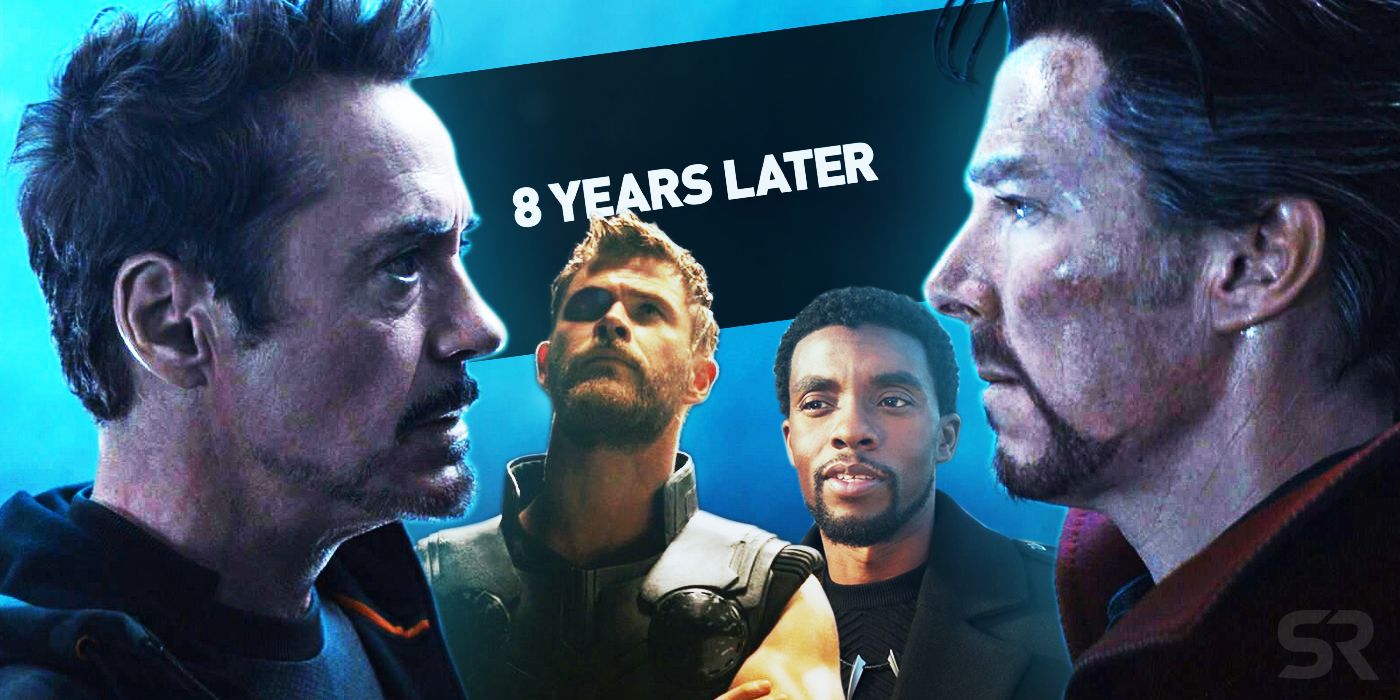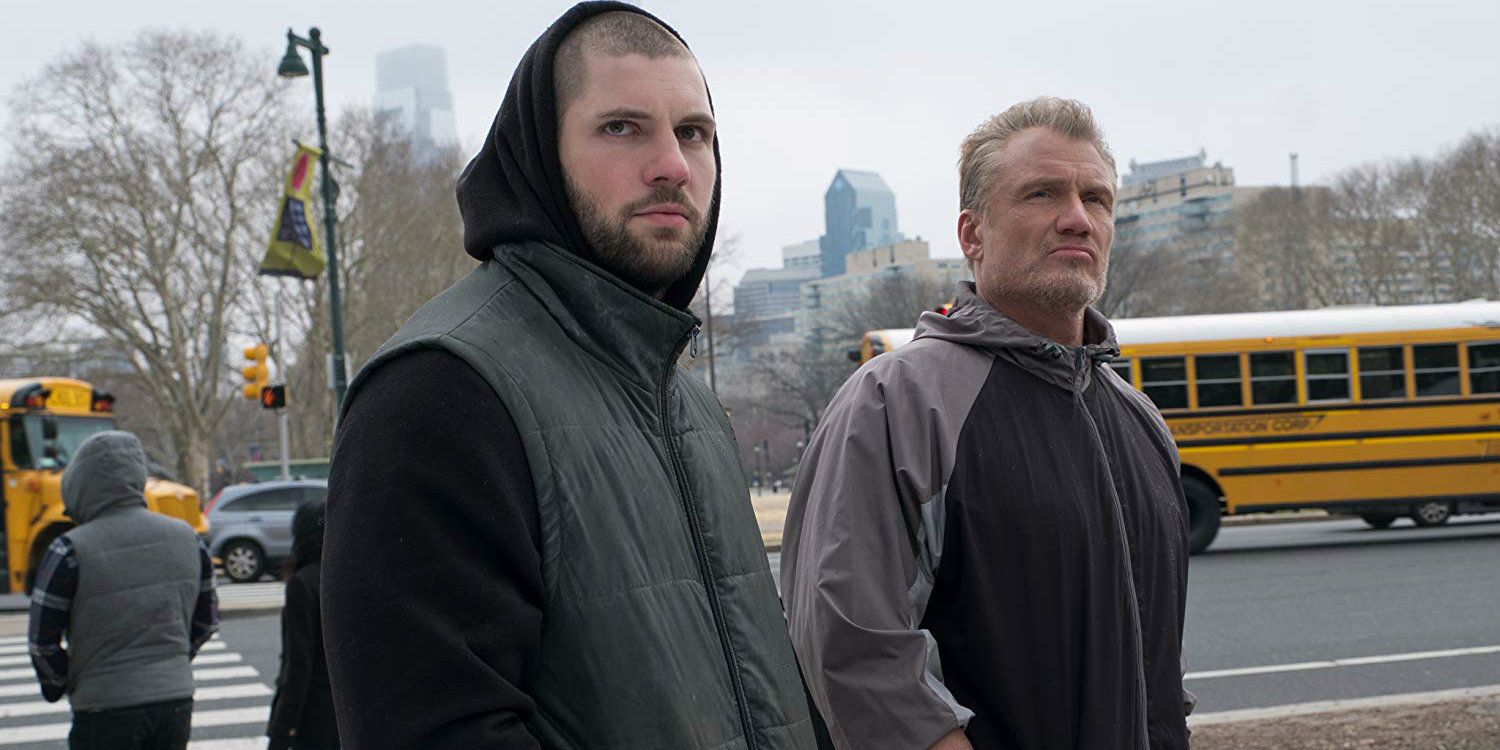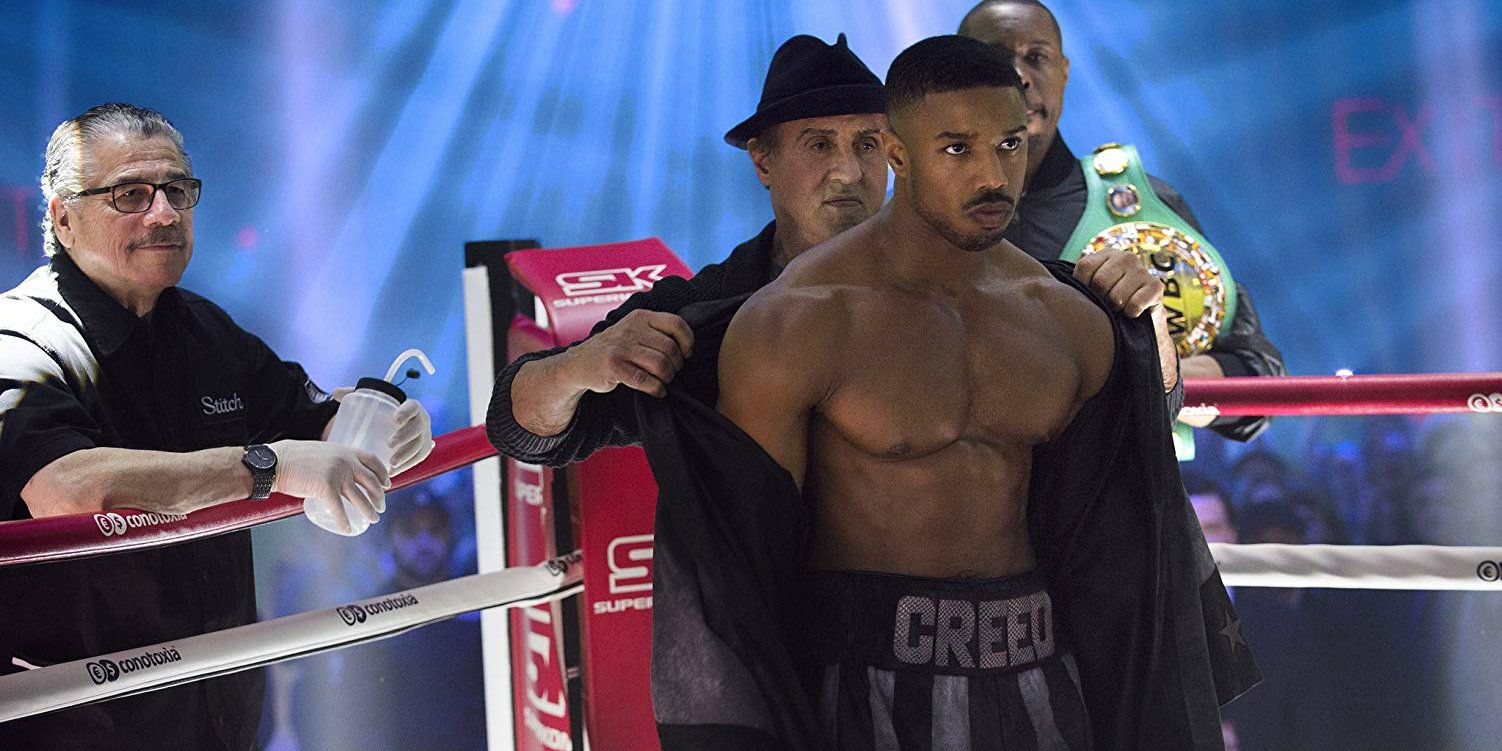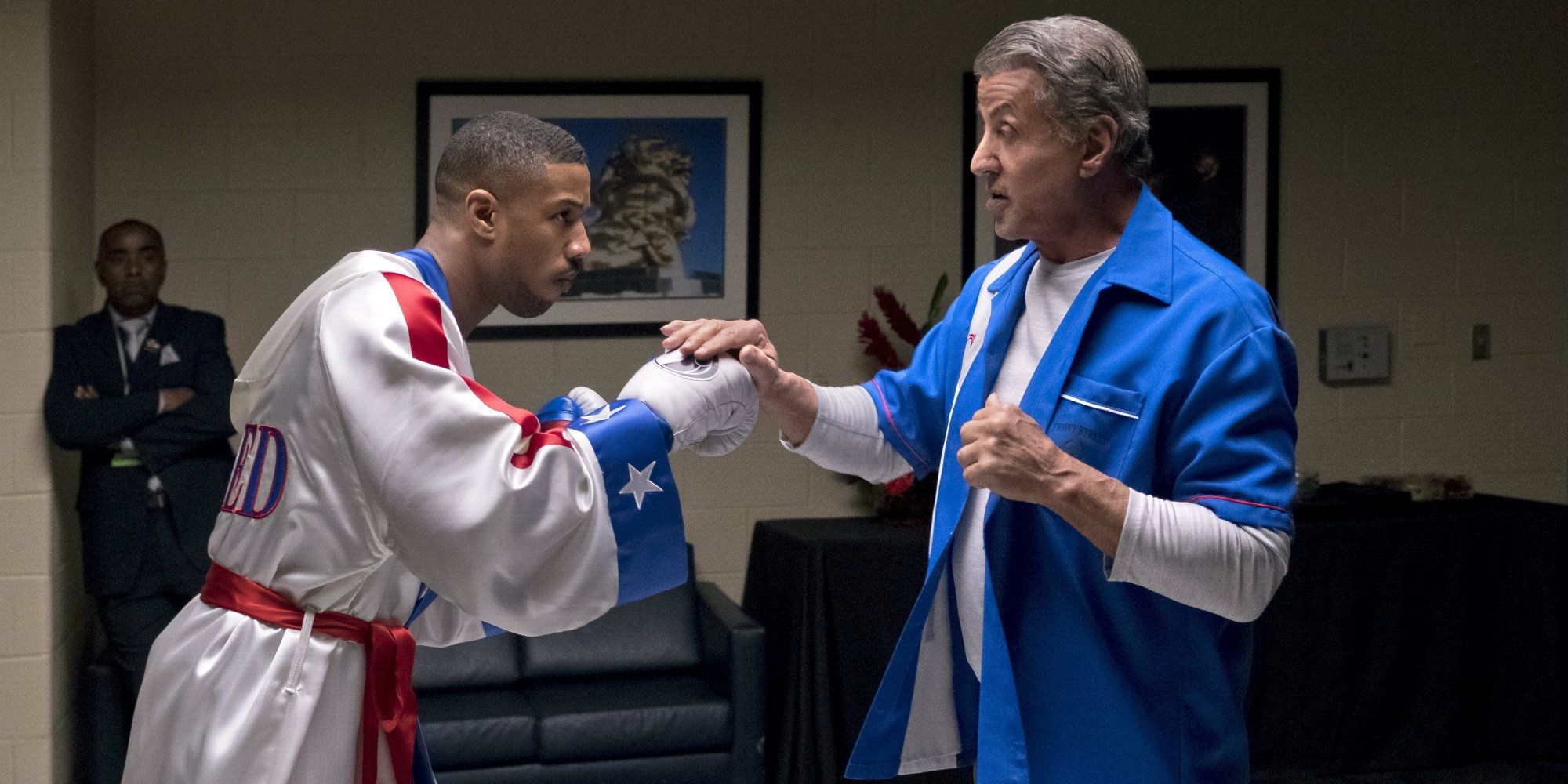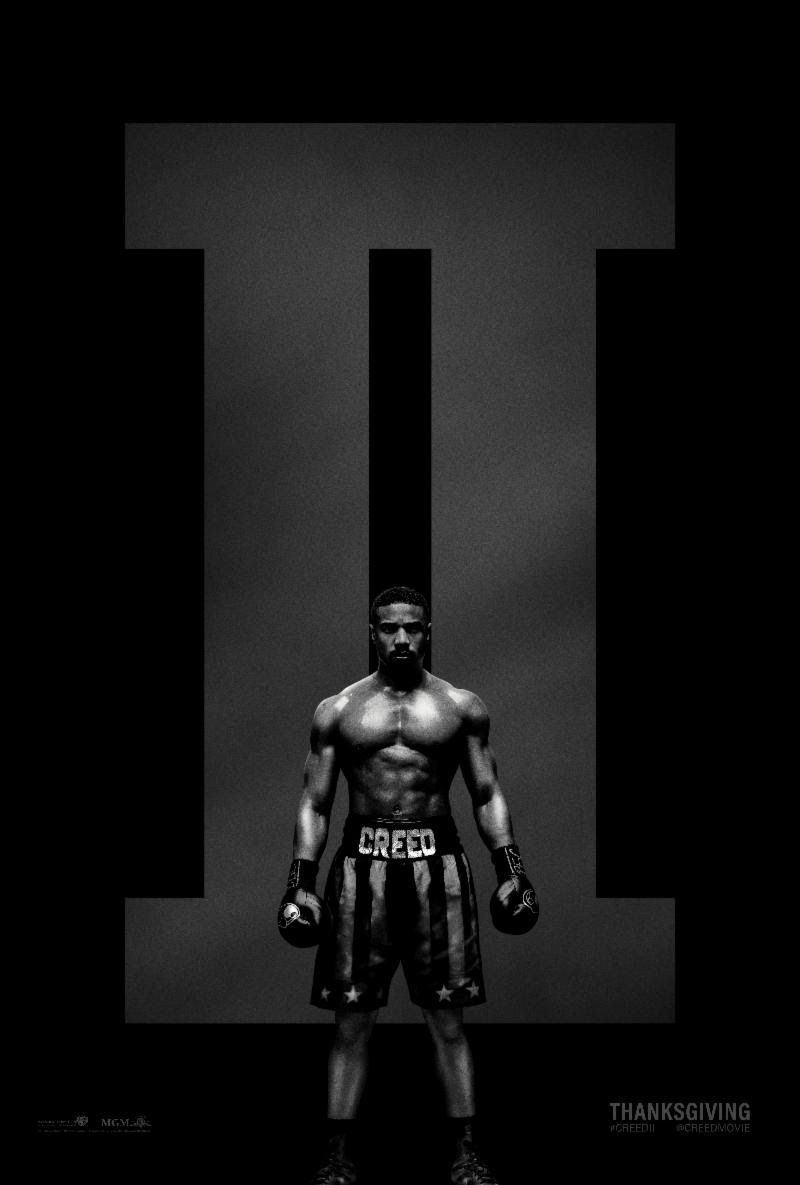Over 40 years later, the timeline of the Rocky franchise holds up better than the decade-old timeline of the Marvel Cinematic Universe. Some fans may scoff that pitting the continuities of the two franchises together is like comparing apples and oranges, but in a way, Rocky Balboa (Sylvester Stallone) was one of the original movie superheroes. The underdog fighter from Philadelphia first inspired audiences with his heart and determination in 1976, 2 years before Christopher Reeve took flight as Superman. By the time Rocky faced Ivan Drago (Dolph Lundgren) in Rocky IV, Balboa's legend was equally superheroic. And even though he has hung up his gloves to mentor Adonis Creed (Michael B. Jordan) in Creed and Creed II, a generation of fans still look up to Rocky as a childhood hero, which is the key to his enduring popularity.
Today, Marvel's movies rule the box office, with their beloved and rapidly-expanding shared superhero universe. However, even with its unprecedented success, the MCU could learn a thing or two from the Rocky franchise. The Rocky/Creed saga has managed to maintain a relatively uncluttered history and remained relevant while many other 1980s franchises like Terminator, Alien, and Predator struggle to re-ignite the spark they had with audiences 30 years ago. For its part, Marvel has released 20 films in 10 years with 3 more coming in 2019, which far outpaces the 8 Rocky franchise films - although amazingly, a Rocky/Creed film has been released in every decade since 1976.
Related: Creed II's Ending And The Franchise's Future Explained
Since 2019 will begin the MCU's second decade, Marvel Studios can perhaps find some inspiration from how well the Rocky franchise has been run. After all, the ties between Marvel and Rocky run deep: Creed director and the mastermind of the 2015 reboot, Ryan Coogler, directed Black Panther (and will be back for the sequel), and the top stars of Creed, Michael B. Jordan, Tessa Thompson, and Sylvester Stallone, have all joined the MCU. Since Marvel and Rocky are sympatico, it's time to compare what Rocky has been doing right that Marvel can learn from.
- This Page: Rocky's 40 Year Timeline Mostly Makes Sense
- Page 2: Creed Improves The Rocky Movies
- Page 3: Rocky's Details Vs Marvel's Big Picture
- Page 4: Rocky Is A Movie Franchise, Marvel Follows Comic Book Logic
Rocky's 40 Year Timeline Mostly Makes Sense - Marvel's 10 Year Timeline Doesn't
One of the biggest things Rocky has going for it over the MCU is that it has a relatively simple timeline and continuity that fans can easily follow. The first film is set in 1976, during the United States' bi-centennial wherein the heavyweight champion of the world, Apollo Creed (Carl Weathers), gives Rocky, an unknown club fighter from South Philadelphia, a title shot to celebrate the American Dream. The sequel and rematch between Rocky and Apollo take place less than a year later (although Rocky II was released in 1979), and Rocky wins and becomes champion.
Flash forward to Rocky III in 1982 where Rocky loses and regains the title from Clubber Lang (Mr. T). Then, in Rocky IV, Balboa faced Ivan Drago during Christmas 1985 to avenge the death of Apollo at Drago's hands. Rocky V's place in the timeline is a special case that will require a bit of clarification, but in it, Rocky retires from fighting until he stages an improbable but triumphant comeback in 2006's Rocky Balboa. Apollo's son, Adonis Creed, then becomes the new main character, with Rocky as his mentor, beginning in 2015's Creed and continuing into 2018's Creed II.
Related: Marvel's Official Timeline Doesn't Fix Continuity - It Makes It Worse
Rocky's 42-year timeline is relatively straightforward and makes sense, with only one major break in continuity revolving around Rocky V and the age of Balboa's son Rocky Jr., who was born in 1976 during Rocky II. When the elder Rocky fought Ivan Drago in 1985, Rocky Jr. (played by Rocky Krakoff) was 9 years old, but when Rocky returned from Russia in Rocky V, his son was inexplicably 14 years old (played by Sage Stallone). Although Rocky V was released in 1990, there wasn't a 5-year gap between Rocky IV and V in the timeline; the latter film took place soon after the former. The best explanation for this is simply that it must have been intentional and not a 'mistake'; writer-director Sylvester Stallone wanted Rocky V to be about Rocky's problems with his teenage son and wanted to cast his real-life son Sage in the role. Therefore, Sly 'aged up' Rocky Jr. to suit the needs of his story. Since Rocky IV and V were released 5 years apart, Rocky Jr. being 14 made sense in the real world, although the movies' actual timeline doesn't match the release dates. Regardless of Rocky V's complications, Rocky's throughline is impressive overall.
By contrast, the MCU has had lots of issues maintaining consistency over their 10 years of continuity. The cracks showed early in Phase 1 leading up to 2012's The Avengers, such as the events of 2008's The Incredible Hulk, 2010's Iron Man 2, and 2011's Thor and Captain America: The First Avenger being retconned into occurring during the same week. The Phase 3 films like Spider-Man: Homecoming, Guardians of the Galaxy Vol. 2, and Black Panther are set at different points in the timeline, furthering confusion. Homecoming's '8 Years Later' title card - meaning that film claiming it's set 8 years after The Avengers - is such an inexplicable break of continuity that Avengers: Infinity War's directors Joe and Anthony Russo waved it away as a 'mistake'. Marvel recently released an official MCU timeline that addresses some issues but overall, the MCU's continuity remains problematic - and next year's Captain Marvel, which is set in 1995, and Avengers 4, which is expected to include time travel, could potentially muddy the waters even further.
Page 2: Creed Improves The Rocky Movies
The Creed Movies Improve The Rocky Movies
Warning: SPOILERS Below For Creed II!
-
The MCU is all connected, and has the advantage of the superheroes inhabiting the same universe so that they can meet each other, which pays off magnificently in the Avengers films. Marvel also uses callbacks constantly, whether it's Easter eggs like in Thor: Ragnarok, when Hela (Cate Blanchett) walked by the first Thor's Casket of Ancient Winters in Odin's Vault, or when in Captain America: The Winter Soldier, Steve Rogers (Chris Evans) toured the Captain America exhibit at the Smithsonian. However, watching a Marvel sequel doesn't necessarily improve the films or shed new light on the films that came before it. For example, Avengers: Infinity War doesn't provide any new insight or offer revelations to either prior Avengers film; rather Infinity War's Thanos (Josh Brolin) is different and inconsistent from the villain in the first two Avengers and in Guardians of the Galaxy. Marvel's films constantly build upon the MCU's macro narrative but they don't enhance their predecessors in the process and they are often busy correcting errors in the prior films.
By contrast, the Creed films have not only managed to work as sequels and as a soft reboot of Rocky, but they also manage to enhance the original films in the process. Creed II worked this particular magic on Rocky IV, which it's really a direct sequel to. The entire story of Adonis Creed becoming a fighter hinges on the fact that Ivan Drago killed Apollo in the ring in 1985, so that Adonis never even got to meet his father. Creed II not only centers on Adonis facing Ivan's son Viktor (Florian Munteanu), turning Creed vs. Drago into a generational rivalry but in the process Creed II shed compelling new light on the events of Rocky IV and what happened afterward.
Related: What Creed II Doesn't Tell You About Rocky IV
In Creed II, we learn that Ivan is damaged, having suffered for 33 years after losing that pivotal fight to Rocky Balboa. Soon after his defeat, Drago's wife Ludmilla (Brigette Nielsen) left Ivan and abandoned their young son Viktor. According to Ivan, the Drago name was scorned for decades in Russia - a fact he tells Rocky when he visits Balboa in his Philadelphia restaurant, which has walls covered with photographs of his career, friends, and triumphs (but none of Ivan, the Russian noticed). Ivan and Viktor also pay a visit to the famous statue of Rocky in Philadelphia, which brings chills to longtime fans who understand the significance of that moment. However, Creed II goes even deeper: rather than paint the Dragos as pure villains, the film humanizes them and turns Ivan into a complete person who truly does love his son more than anything - even more than his quest for revenge against Balboa and Creed. It all works wonderfully so that when fans revisit Rocky IV and watch the younger Ivan, the knowledge of what happens to him brings new significance to the events of the 1985 film.
The events of the past and the issue of legacy underscores the Creed films, which draw upon fans' nostalgia for Rocky but also build upon it. Adonis yearns to be the man his father was - he even wears Apollo's American flag trunks, which is now an heirloom passed from Apollo to Rocky to Adonis - but in Creed II, he finds that even becoming heavyweight champion of the world doesn't help Adonis escape from Apollo's shadow. Meanwhile, Rocky himself provides a physical and spiritual link to the wisdom and mistakes of the past and he tries as hard as he can to keep Adonis from repeating those mistakes. The Creed films have a symbiotic effect on the Rocky films where fans now know the story spans generations while the newer films masterfully fill in gaps in the older film. All of this creates a richer overall Rocky universe that is keeping the franchise strong and moving forward.
Page 3: Rocky's Details Vs Marvel's Big Picture
Rocky Pays Attention To The Little Details, Marvel Continuity Only Works In The Big Picture
Rocky and the MCU share something else in common: they both have a mastermind who completely understand their respective universes. The MCU has Marvel President Kevin Feige while Rocky boasts Sylvester Stallone, who invented the core characters, has written most of the films, and directed 4 of them. Rocky's relatively smooth continuity (and its biggest divergence in Rocky V) can be credited to Stallone, who thoroughly understands these characters and their history. Stallone not only gave Ryan Coogler his blessing for Creed, but he also worked with the young filmmaker to make the reboot true to the Rocky franchise. Creed II also benefits from Stallone being hands-on as co-writer, though he opted not to direct.
Of course, there is a big difference between how the Rocky/Creed films are made versus the massive machine of the MCU. There is, after all, no Rocky shared universe and everything can be focused on one film at a time every few years, as opposed to how Feige juggles producing multiple films by different creative teams to deliver 2-3 Marvel movies per year. Therefore, it makes sense that Marvel tends to focus on the big picture - making sure the needs of the overall shared universe are served - which sometimes leads to inconsistencies in the details. What's more, the MCU movies are superhero fantasy films utilizing various storytelling tools like flashbacks, traveling to outer space, other dimensions, and magic, which push the boundaries of reality but also contribute to making the big picture messy.
Related: Legacy Heroes Can Stop The MCU From Going Stale After Avengers 4
By contrast, the Creed movies play to the strengths of their genre. They are sports films set in the real world with hard and fast rules anchored in reality. This allows the Rocky franchise to focus on attention to detail, which the Creed films are masterful at. Adonis' very existence, as a heretofore unknown son born from a secret affair Apollo had, was the biggest pill for fans to swallow, but Coogler's smart writing smoothed it all away by having him adopted and raised by Apollo's widow Mary Anne (Phylicia Rashad). When Adonis seeks out Rocky to be his mentor, Creed maintains a high level of consistency by staying true to Rocky's continuity. (The film even answered the 30-year-old question of who won the secret third Rocky vs. Apollo fight at the end of Rocky III.) Ultimately, Creed brilliantly builds upon Rocky while forging a new future for the overall saga.
Creed II goes even further by displaying the franchise's drive to continually improve; the sequel delved deeper into Adonis' psyche so that he fully emerged as his own man by the end, while the film tied up the franchise's many loose ends and set the saga on a path where the story could go anywhere in Creed III and beyond. All the while, the quality of filmmaking remains extraordinary and the major beats fans flock to a Rocky film for, like inspiring training montages and thrilling boxing matches, never cease to deliver.
Page 4: Rocky Is A Movie Franchise, Marvel Follows Comic Book Logic
Rocky Is A Movie Franchise - Marvel Follows Comic Book Logic
The biggest key to Rocky's consistency is that ultimately it operates under the rules of sports movie franchise, as opposed to a comic book movie franchise. Despite Rocky V's continuity glitch and the retcon establishing Adonis Creed's existence, the Rocky/Creed films haven't compromised their own timeline with prequels. The Rocky movies move in a clear, linear fashion with a set beginning - the first Rocky in 1976 - from which everything follows.
During Rocky's timeline, characters have died, Rocky himself has aged appropriately, and the saga now spans two generations. Therefore, fans who have been with Rocky since the beginning have grown up admiring the fighter and regard him as a beloved old friend, while newer fans can discover Rocky through the Creed films and can go back and chart the saga's throughline from Rocky to Adonis. Marvel can also learn another huge lesson from Rocky and finally create musical scores for their superheroes as inspiring and memorable as Rocky's theme music is.
Related: Every Returning Rocky Character In Creed II
Like Rocky, the MCU's success stems from creating characters fans have grown to love and can't wait to share their latest adventures with, but as the MCU continues, its cracks stem from their comic book origins. For example, superheroes tend to not age and Marvel has not actively dealt with many of their characters being older now than when they were first introduced - whereas Rocky deals directly with the passage of time and the wisdom learned from victories and failures. Marvel's comic book logic asks fans to accept gaps of consistency since the comic book medium itself is replete with stories that contradict each other, retcon themselves, and are constantly in flux. As a comic book fantasy, the MCU indulges the type of comic book logic that makes trying to follow the universe as one consistent narrative more and more difficult.
Meanwhile, because Rocky was born as a movie franchise, Stallone and his fellow filmmakers had the luxury of being able to spend years planning each succeeding sequel to further the story (without the demands of maintaining a shared universe) and the Rocky franchise benefits from adhering to the rules of movie continuity. In fact, Stallone likely never dreamed he'd still be making Rocky movies and playing the beloved fighter 42 years later in Creed II. After their own monumentally successful first decade, this is exactly the type of longevity Marvel Studios is hoping to achieve.

